A few kilometers off the Chinese coast, Beijing has appointed a Taiwanese citizen as deputy chief of an experimental “common homeland” that is an unusually forward overture to Taipei.
Pingtan island is physically China’s closest spot to Taiwan, and is now also being transformed into its nearest approximation of a unified country, as part of Beijing’s long-held dream to reclaim Taiwan, which it considers a rogue province.
New towers crowd the shoreline and the glow of construction sites fills the night, while Taiwanese are being invited to serve in the government, drive Taiwanese-licensed cars and open Taiwanese currency bank accounts.

Photo: AFP
However, the economic potential of the “experimental zone” has yet to be proved, and with Beijing setting the rules, its hints at political integration may well be rebuffed.
“It’s basically the Chinese creating what they see as what future integration would look like — without really much input from Taiwan,” said Bonnie Glaser, a senior adviser at the US-based Center for Strategic and International Studies.
“It may help some individual Taiwan companies make some money, but I don’t think it’s going to promote the political goals that they seek,” she added.

Photo: AFP
“The political symbolism in all of this is seen as potentially threatening to Taiwan,” Glaser added.
For decades the threat of conflict loomed, with both sides of the Taiwan Strait claiming to represent the whole of China. Beijing has described unification as a “historical mission,” to be imposed by force if necessary.
At the same time, a “one country, two systems” model is on offer, similar to the arrangements with Hong Kong, the former British colony turned semi-autonomous Chinese territory.
Beijing has sought warmer ties in recent years and on Tuesday Taiwan’s Mainland Affairs Council (MAC) Minister Wang Yu-chi (王郁琦) will visit China in the two sides’ first official contact in six decades.
Meanwhile authorities have also sought to attract Taiwanese — along with their investment and knowhow — with generous subsidies and fasttrack business services.
Pingtan goes further, with Beijing promising it will be “jointly planned, jointly developed, jointly operated, jointly managed and jointly profiting.”
The project has been allocated at least 250 billion yuan (US$41 billion) since it was approved in 2009 — when it was an outcrop of humble fisheries that did not even have a bridge connecting it to the mainland.
Now shiny brochures promise an island bursting with gleaming skyscrapers, leafy villas and Asia’s largest private museum.
The MAC in 2012 distanced itself from the project and its claim to be a “joint” effort, but Beijing is pressing ahead, recruiting Taiwanese to fill deputy posts across the local government, in what University of Nottingham lecturer Lee Chun-yi called both “a symbolic step and an effort to absorb outside experience.”
A 50-year-old finance expert, named Liang Qinlong, has been appointed deputy head of the zone’s management committee, an official told reporters.
Liang said he could not give interviews due to sensitivities with Taipei. Pingtan’s economy grew 16 percent in the first half of last year, and as of November, 129 Taiwan-funded businesses had set up shop, China’s China Daily reported.
“The State Council has an overall policy of offering lots of benefits to Taiwanese and we are very happy to see those being gradually put into place,” said Shuie Chin Te, a 50-year-old Taiwanese businessman who recently recruited his son-in-law to join him on the island.
Still, Pingtan must prove it can become more than an overgrown construction site.
A new port has been built to receive ferries from Taiwan, but daily services have yet to begin.
A Taiwanese restaurateur surnamed Chang (張), sitting in an empty food court, said he was losing patience after nearly three years of bad business.
“Beijing is really promoting this, they want to make it even better than Hong Kong or Shanghai, so the opportunities are limitless — but the policies are coming too slowly,” he said.
Meanwhile the onslaught of development has made winners and losers of the original islanders.
Some complained that construction work went to non-local crews brought in by developers, while living costs had spiked, and a fisherman surnamed Chen (陳) said their seaside houses were being torn down.
“There have been no benefits at all,” he said.
Yet 28-year-old art entrepreneur Lin Ping said business prospects had soared and the new bridge and roads had slashed travel times.
“If it weren’t for Taiwan, Pingtan wouldn’t be all that it is today,” he said. “As for promoting reunification, that’s hard to say.”

A preclearance service to facilitate entry for people traveling to select airports in Japan would be available from Thursday next week to Feb. 25 at Taiwan Taoyuan International Airport, Taoyuan International Airport Corp (TIAC) said on Tuesday. The service was first made available to Taiwanese travelers throughout the winter vacation of 2024 and during the Lunar New Year holiday. In addition to flights to the Japanese cities of Hakodate, Asahikawa, Akita, Sendai, Niigata, Okayama, Takamatsu, Kumamoto and Kagoshima, the service would be available to travelers to Kobe and Oita. The service can be accessed by passengers of 15 flight routes operated by

GIVE AND TAKE: Blood demand continues to rise each year, while fewer young donors are available due to the nation’s falling birthrate, a doctor said Blood donors can redeem points earned from donations to obtain limited edition Formosan black bear travel mugs, the Kaohsiung Blood Center said yesterday, as it announced a goal of stocking 20,000 units of blood prior to the Lunar New Year. The last month of the lunar year is National Blood Donation Month, when local centers seek to stockpile blood for use during the Lunar New Year holiday. The blood demand in southern Taiwan — including Tainan and Kaohsiung, as well as Chiayi, Pingtung, Penghu and Taitung counties — is about 2,000 units per day, the center said. The donation campaign aims to boost

MORE FALL: An investigation into one of Xi’s key cronies, part of a broader ‘anti-corruption’ drive, indicates that he might have a deep distrust in the military, an expert said China’s latest military purge underscores systemic risks in its shift from collective leadership to sole rule under Chinese President Xi Jinping (習近平), and could disrupt its chain of command and military capabilities, a national security official said yesterday. If decisionmaking within the Chinese Communist Party has become “irrational” under one-man rule, the Taiwan Strait and the regional situation must be approached with extreme caution, given unforeseen risks, they added. The anonymous official made the remarks as China’s Central Military Commission Vice Chairman Zhang Youxia (張又俠) and Joint Staff Department Chief of Staff Liu Zhenli (劉振立) were reportedly being investigated for suspected “serious

ENHANCING EFFICIENCY: The apron can accommodate 16 airplanes overnight at Taoyuan airport while work on the third runway continues, the transport minister said A new temporary overnight parking apron at Taiwan Taoyuan International Airport is to start operating on Friday next week to boost operational efficiency while the third runway is being constructed, the Ministry of Transportation and Communications said yesterday. The apron — one of the crucial projects in the construction of the third runway — can accommodate 16 aircraft overnight at the nation’s largest international airport, Minister of Transportation and Communications Chen Shih-kai (陳世凱) told reporters while inspecting the new facility yesterday morning. Aside from providing the airport operator with greater flexibility in aircraft parking during the third runway construction,